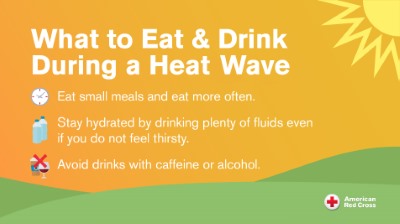As record heat continues to blanket our area this summer, knowing how to protect yourself and your family safe from heat related illnesses is important. You should note that some people are more at risk of developing a heat-related illness, including adults over 65, those with chronic medical conditions, people who work outside, infants and children, and athletes.
Here at the American Red Cross, we have steps and tips to help you stay safe as the temperatures soar.
• Stay hydrated. Drink plenty of fluids. Avoid drinks with caffeine or alcohol.
• Stay cool with an air conditioner. Check on family, friends and neighbors who do not have air conditioning, who spend much of their time alone or who are more likely to be affected by the heat. If you don’t have air conditioning, seek relief from the heat during the warmest part of the day in places like schools, libraries, theaters, malls, etc.
• Dress for the weather. Wear loose-fitting, lightweight, light-colored clothing. Avoid dark colors because they absorb the sun’s rays.
• Hot cars can be deadly. Never leave children or pets in your vehicle. The inside temperature of the car can quickly reach 120 degrees.
As the parent to two student-athletes, I know August often includes sports team practices for football, soccer, swimming, water polo, lacrosse, track and other fall sports. The Red Cross encourages coaches and athletes to take extra precautions in this heat.
• Schedule practice during cooler times. Avoid scheduling workouts and exercise during the hottest times of the day — schedule them for early in the day or later in the evening.
• Take breaks. Have players take frequent, longer breaks. Stop about every 20 minutes to drink fluids and try to have them stay in the shade.
• Dress for weather. Reduce the amount of heavy equipment athletes wear in the extremely hot weather. Dress athletes in net-type jerseys or lightweight, light-colored cotton T-shirts and shorts. Don’t forget to apply sunscreen.
Even with precautions, excessive heat can lead to sunburn, heat cramps, heat exhaustion and heat stroke. Monitoring your family members and knowing the signs of heat-related emergencies can help you to help others cope with extreme weather.
• HEAT CRAMPS are muscle pains and spasms in the legs or abdomen. Heat cramps are an early sign of trouble, and athletes should inform those in charge if they are not feeling well. If someone is experiencing heat cramps, get them to a cooler place to rest, lightly stretch the affected muscle, and slowly replenish their fluids with a half a glass (about 4 ounces) of cool water every 15 minutes.
• HEAT EXHAUSTION is a more severe condition signaled by cool, moist, pale or flushed skin; heavy sweating; headache; nausea or dizziness; or weakness and exhaustion. To treat heat exhaustion, move them to a cooler place, remove or loosen tight clothing and spray the person with water or apply cool, wet cloths to the skin. If they are conscious, give small amounts of cool water to drink slowly. If the person refuses water, vomits or begins to lose consciousness, call 911.
• HEAT STROKE Heat stroke is a life-threatening emergency when someone is overwhelmed by heat and their body begins to stop functioning. Signs include hot, red skin that could be dry or moist; changes in consciousness; vomiting and high body temperature. Call 911 immediately if someone shows signs of heat stroke. If possible, move the person to a cooler place and immerse them up to their neck in cold water. Otherwise, douse or spray the person with cold water, or cover the person with cold, wet towels or bags of ice.
You can download the Red Cross First Aid app which puts instant access to information on handling the most common first aid emergencies at your fingertips including heat-related emergencies. Download this app by searching for ‘American Red Cross’ in your app store or at redcross.org/apps.
Stay cool and stay safe!
Stephanie Dunn Ashley is the CEO of the Metro New York North Chapter of the American Red Cross. The MNYN Chapter encompasses Greenwich, Conn., the U.S. Military Academy at West Point, plus Westchester and Rockland Counties.






